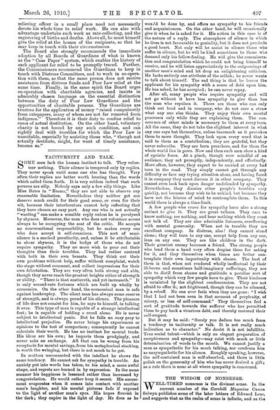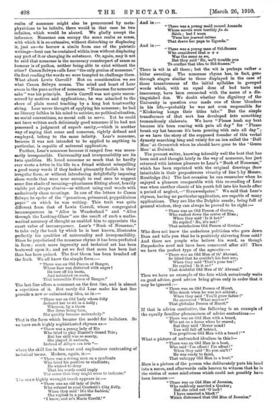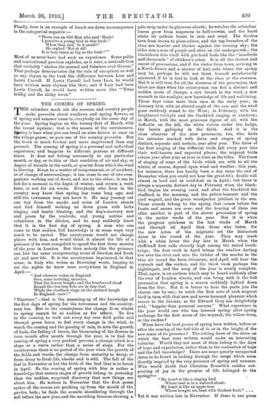THE WISDOM OF NONSENSE.
WELL-TIMED nonsense is the divinest sense. In the current number of the Cornhill Magazine Canon Selwyn publishes some of the later letters of Edward Lear, and suggests that as the realm of sense is infinite, and as the
realm of nonsense might also be pronounced by meta- physicians to be infinite, there would in that ease be two infinites, which would be absurd. We gladly accept the inference. Nonsense can occupy the same realm as sense, with which it is co-extensive, without disturbing or displacing it, just as—to borrow a simile from one of the patristic writings—heat can be contained within iron without displacing any part of it or changing its substance. Or, again, may it not be said that nonsense is the necessary counterpart of sense as humour is of pathos, neither being able to exist without the other P Canon Selwyn calls Lear "the only genius of nonsense."
On first reading the words we were tempted to challenge them. What about Lewis Carroll P But on consideration we see what Canon Selwyn means.. The mind and heart of Lear swam in the pure aether of nonsense. "Nonsense for nonsense' sake" was his principle. Lewis Carroll was not quite uncon- cerned by motives and applications ; he was attached to the shore of plain moral teaching by a long but trustworthy string. Lear never thought of applying his nonsense ; he had no literary foibles in his mind to satirise, no political situation, no social conventions, no moral cult to serve. Yet he could not have written such deliciously good nonsense if he had not possessed a judgment of superb sanity,—which is another way of saying that sense and nonsense, rightly defined and employed, belong to the same infinity. Lear's nonsense, because it was not intended to be applied to anything in particular, is capable of universal application.
Further, Lear's nonsense because it ranged free was neces- sarily irresponsible. Universality and irresponsibility are its twin qualities. He loved nonsense so much that he hardly ever wrote a letter in his life to a friend without misspelling a good many words if they looked pleasantly foolish in their irregular form, or without introducing delightfully imposing sham words that were near enough to real ones to suggest some fine shade of meaning—phantasms flitting about, heavily visible yet always elusive—or without using real words with
audaciously sham meanings. In one of the letters to Canon Selwyn he spoke of the " penurious, primaeval, poppsidixious paper" on which be was writing. This trait was quite
different from that of Lewis Carroll, whose congregated inconsequences in "Alice in Wonderland" and "Alice through the Looking-Glass" are the result of such a mathe- matical accuracy of thought as enabled him to appreciate the exact value of inconsequence. Lear's "Book of Nonsense," to take only the book by which he is best known, illustrates
perfectly his qualities of universality and irresponsibility. Since he popularised the nonsense rhyme it has been perfected
in form ; much more ingenuity and technical art has been bestowed upon it ; and yet we feel that more has been lost than has been gained. The first bloom has been brushed off the fruit. We all know the simple form :—
" There was an Old Person of Bangor, Whose face was distorted with anger ! He tore off his boots,
And subsisted on roots, That borascible Person of Bangor."
The last line offers a comment on the first line, and is almost a repetition of it. But rarely did Lear make his last line
provide a new or culminating idea, as in
"There was an Old Lady whose folly Induced her to sit in a holly ; Whereon by a thorn
Her dress being torn, She quickly became melancholy."
That is the form which became the model for imitators. So
we have such highly sophisticated rhymes as— "There was a young lady of Rio
Who tried to play Handers Grand Trio; But her skill was so scanty, She played it andante Instead of Allegro con trio
where the skill lies in the neat and euphonious contrasting of technical terms. Modern, again, is :— " There was a strong man on a syndicate
Who tried his position to vindicate;
He wished to deny That his words could imply The sense that they might seem to indicate?'
be sal le highly wrought touch appears in "There was an old lady of Delhi Who refused to read Crockett's Cleg Kelly.
When they said ' It's the fashion,'
She replied in a passion know, and so's Marie Coral? "
And in :—
" There was a young maid named Amanda Whose novels were terribly fin de &Me ; but I wean 'Twee her journal intimo That drove her papa to Uganda."
And in :—
"There was a young man of Sid-Sussex Who considered that w Was the same as ww, But they said Sir, we'll trouble you To confine that idea to Sid-Sussex?"
There is wit in all these ; but the wit is perhaps rather a
bitter sweeting. The nonsense rhyme has, in fact, gone through stages similar to those displayed in the case of those transferences of the initial syllables in grouped words which, with an equal dose of bad taste and inaccuracy, have been connected with the name of a dis- tinguished don. We doubt whether the dignitary of the University in question ever made one of these blunders in his life,—probably he was not even responsible for "Kinkering kongs their titles take." But the simple transference of that sort has developed into something tremendously elaborate. We have "Please hush my brat because it's been roaring with pain all day" for "Please brush my hat because it's been pouring with rain all day", ; or we have the story of the supposed founder of this verbal
dynasty searching long and vainly for an inn called the ' Dull Man' at Greenwich when he should have gone to the 'Green
Man' at Dulwich.
The present writer, knowing tolerably well the best that has been said and thought lately in the way of nonsense, has just returned with intense pleasure to Lear's "Book of Nonsense," which has been reprinted with the original drawings (how inimitable is their preposterous vivacity of line !) by Messrs.
Routledge (is.) The last occasion he can remember when he enjoyed a pleasure comparable with this re-reading of Lear was when another classic of his youth fell into his hands after a period of neglect,—" Struwwelpeter." We said that Lear's rhymes, having no particular application, are capable of many applications. They are like the Delphic oracle ; being full of general wisdom, they can always be proved to be right :—
" There was an Old Person of Gretna,
Who rushed down the crater of Etna; When they said 'Is it hot!' He replied No, it's not!'
That mendacious Old Person of Gretna."
Who does not know the audacious politician who goes down Etna and tells you that he is positively shivering from cold? And there are people who believe his word, as though Empedocles need not have been consumed after all! Then we have the perfect type of the agnostic:—
" There was an Old Man of th' Abruzzi,
So blind that he couldn't his foot see ; When they said 'That's your toe!'
He replied Is it so ? '
That doubtful Old Man of th' Abruzzi."
Then we have an example of the fate which notoriously waits on good advice, good advice being given only in order that it may be ignored :—
" There was an Old Person of Hurst,
Who drank when he was not athirst; When they said 'You'll grow fatter !'
He answered What matter?' That globular Person of Hurst."
If that is advice combative, the following is an example of the equally familiar phenomenon of advice sententious :—
"There was an Old Man with a beard,
Who sat on a horse when he reared; But they said 'Never mind!
You will fall off behind,
You propitious Old Man with a beard !'" What a picture of unfounded idealism in this I- " There was an Old Man in a boat,
Who said I'm afloat! rm afloat!' When they said 'No you ain't!' He was ready to faint, That unhappy Old Man in a boat."
Here is a picture of the person who deliberately puts his head
into a noose, and afterwards calls heaven to witness that he is the victim of some misfortune which could not possibly have
been foreseen :— "There was an Old Man of Jamaica, Who suddenly married a Quaker; But she cried out '0 lack!
I have married a black!'
Which distressed that Old Man of Jamaica." Finally, here is an example of knock-me-down inconsequence in the categorical negative :—
"There was an Old Man who said 'Hush! I perceive a young bird in this bush !' When they said Is it small?' He replied 'Not at all ! It is four times as big as the bush !'" Most of us must have had such an experience. Some polite and conventional question explodes, as it were, a contradiction that veritably "shakes the arsenal and fulmines over Greece." That perhaps demonstrates (by the rule of exception) as well as any rhyme in the book the difference between Lear and Lewis Carroll. If Lewis Carroll had been Lear, he would have written more rhymes like that ; and if Lear had been Lewis Carroll, he would have written more like " 'Twas brillig and the slithy toves."








































 Previous page
Previous page